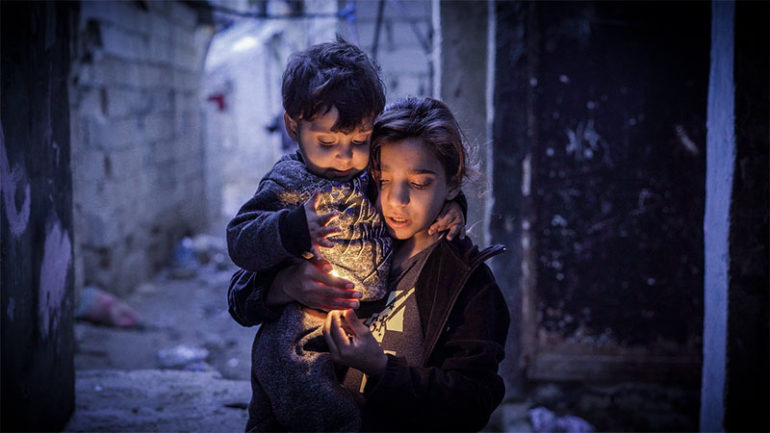High above the rooftops of Beirut, we watch silently as a flock of birds drift above the majestic city, a sunrise breaking on the horizon, its golden hue bathing the metropolis in a soft light. Down below, through tangled knots of exposed wires and rolls of razor wire, a different picture is suddenly brought into focus; a densely packed maze of derelict concrete homes, interlaced with alleys and laneways overrun with rubbish and rubble. It’s down here in the squalor and deprivation that we are introduced to four families who count the Sabra and Shatila districts of Beirut as their homes.
In The Shadow of Beirut is an uncompromising look at the daily struggle of the inhabitants at the margins of the city as Lebanon spirals deeper and deeper into an economic crisis made worse by the COVID-19 pandemic and a devastating tragedy that rocked Beirut to its core in 2020; a fiery explosion that engulfed the port area of the city and claimed more than 200 lives. The people of Sabra and Shatila scrape and scrabble to eke out a living, surviving day to day and accumulating debt that will never be paid back.
The documentary follows Abu Ahmad, an eight-year-old Syrian boy forced to work in the streets so that his family earn enough money for food, and Sanaa, a young teen trying to navigate the expectations of her family and an arranged engagement while also making sense of her own hopes and dreams for a future. We meet Aboodi, a young father struggling to leave behind a torrid past and embrace a fresh beginning for the sake of his newborn son. Finally, there’s Rabia, an immigrant Lebanese mother with a chronically ill daughter who cannot walk and for whom life is particularly harsh as the family cannot seek medical help due to their undocumented status.
Weaving the story of these four families together, directors Garry Keane and Steven Gerard Kelly ask us not to look away from the hardships these people face but rather to acknowledge it, acknowledge them and try as they do to focus on the fleeting moments of beauty they still manage to find in life and hold onto the hope that their future generations will find a way to make things just a little better.
As grim and heartbreakingly cruel as life is on the fringes of a society that clearly has turned its back on these people, the most striking thing about In The Shadow of Beirut is the grace and dignity with which our protagonists face each day. There’s a resilience in these people and in the hundreds of thousands like them across the city, a strength borne out of the bond of family and love that no price can be put on. It’s compelling and prescient storytelling, unflinching in its narrative but full of purpose and soul.

